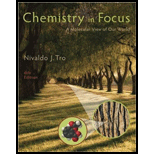
Bundle: Chemistry In Focus: A Molecular View Of Our World, 6th + Owlv2 6-month Printed Access Card
6th Edition
ISBN: 9781305618374
Author: Nivaldo J. Tro
Publisher: Cengage Learning
expand_more
expand_more
format_list_bulleted
Question
Chapter 17, Problem 54E
Interpretation Introduction
Interpretation:
The way that hallucinogens work in producing their distortion of perception effects is to be discussed.
Concept Introduction:
Hallucinogens are hallucinogenic drugs that distort and distress the cognition and perception of humans. When taken in high doses, they produce vivid hallucinations, including dancing colors and lights. These hallucinogens are also known as psychedelics or mind blenders. Hallucinogens suppress the filtering ability of nerve cells, thus resulting in the distortion of perception.
Expert Solution & Answer
Want to see the full answer?
Check out a sample textbook solution
Students have asked these similar questions
>
You are trying to decide if there is a single reagent you can add that will make the following synthesis possible without any other
major side products:
1. ☑
CI
2. H3O+
O
Draw the missing reagent X you think will make this synthesis work in the drawing area below.
If there is no reagent that will make your desired product in good yield or without complications, just check the box under the
drawing area and leave it blank.
Click and drag to start drawing a
structure.
Explanation
Check
?
DO
18
Ar
B
© 2025 McGraw Hill LLC. All Rights Reserved. Terms of Use | Privacy Center | Accessibility
Don't use ai to answer I will report you answer
Consider a solution of 0.00304 moles of 4-nitrobenzoic acid (pKa = 3.442) dissolved in 25 mL water and titrated with 0.0991 M NaOH. Calculate the pH at the equivalence point
Chapter 17 Solutions
Bundle: Chemistry In Focus: A Molecular View Of Our World, 6th + Owlv2 6-month Printed Access Card
Ch. 17 - Prob. 1SCCh. 17 - Prob. 1ECh. 17 - Prob. 2ECh. 17 - Prob. 3ECh. 17 - Prob. 4ECh. 17 - Prob. 5ECh. 17 - Prob. 6ECh. 17 - Prob. 7ECh. 17 - Prob. 8ECh. 17 - Prob. 9E
Ch. 17 - Prob. 10ECh. 17 - Prob. 11ECh. 17 - Prob. 12ECh. 17 - Prob. 13ECh. 17 - Prob. 14ECh. 17 - Prob. 15ECh. 17 - Prob. 16ECh. 17 - Prob. 17ECh. 17 - Prob. 18ECh. 17 - Prob. 19ECh. 17 - Prob. 20ECh. 17 - Prob. 21ECh. 17 - Prob. 22ECh. 17 - Prob. 23ECh. 17 - Prob. 24ECh. 17 - Prob. 25ECh. 17 - Prob. 26ECh. 17 - Prob. 27ECh. 17 - Prob. 28ECh. 17 - Prob. 29ECh. 17 - How do cancer-fighting chemicals target cancerous...Ch. 17 - Prob. 31ECh. 17 - Prob. 32ECh. 17 - Prob. 33ECh. 17 - Prob. 34ECh. 17 - Prob. 35ECh. 17 - Prob. 36ECh. 17 - Prob. 37ECh. 17 - Prob. 38ECh. 17 - Prob. 39ECh. 17 - Prob. 40ECh. 17 - Prob. 41ECh. 17 - Prob. 42ECh. 17 - Prob. 43ECh. 17 - Prob. 44ECh. 17 - How do drugs like naltrexone and methadone help a...Ch. 17 - What are endorphins?Ch. 17 - Prob. 47ECh. 17 - What are the effects of cocaine and amphetamine?...Ch. 17 - Prob. 49ECh. 17 - Prob. 50ECh. 17 - Prob. 51ECh. 17 - What are the side effects of smoking?Ch. 17 - What is a hallucinogen? Give some examples.Ch. 17 - Prob. 54ECh. 17 - Prob. 55ECh. 17 - What are the primary effects of LSD and of...Ch. 17 - Prob. 57ECh. 17 - Prob. 58ECh. 17 - Prob. 59ECh. 17 - Prob. 60ECh. 17 - Prob. 61ECh. 17 - Draw the chemical structure of aspirin, and...Ch. 17 - Prob. 63ECh. 17 - Prob. 64ECh. 17 - Prob. 65ECh. 17 - Prob. 66ECh. 17 - Prob. 67ECh. 17 - Prob. 68ECh. 17 - Prob. 69ECh. 17 - Prob. 70ECh. 17 - Prob. 71ECh. 17 - Prob. 72ECh. 17 - Prob. 73ECh. 17 - Prob. 74ECh. 17 - Prob. 75ECh. 17 - Prob. 76ECh. 17 - Prob. 77ECh. 17 - Prob. 78E
Knowledge Booster
Similar questions
- What is the name of the following compound? SiMe3arrow_forwardK Draw the starting structure that would lead to the major product shown under the provided conditions. Drawing 1. NaNH2 2. PhCH2Br 4 57°F Sunny Q Searcharrow_forward7 Draw the starting alkyl bromide that would produce this alkyne under these conditions. F Drawing 1. NaNH2, A 2. H3O+ £ 4 Temps to rise Tomorrow Q Search H2arrow_forward
arrow_back_ios
SEE MORE QUESTIONS
arrow_forward_ios
Recommended textbooks for you

 EBK A SMALL SCALE APPROACH TO ORGANIC LChemistryISBN:9781305446021Author:LampmanPublisher:CENGAGE LEARNING - CONSIGNMENT
EBK A SMALL SCALE APPROACH TO ORGANIC LChemistryISBN:9781305446021Author:LampmanPublisher:CENGAGE LEARNING - CONSIGNMENT Chemistry for Today: General, Organic, and Bioche...ChemistryISBN:9781305960060Author:Spencer L. Seager, Michael R. Slabaugh, Maren S. HansenPublisher:Cengage Learning
Chemistry for Today: General, Organic, and Bioche...ChemistryISBN:9781305960060Author:Spencer L. Seager, Michael R. Slabaugh, Maren S. HansenPublisher:Cengage Learning Organic ChemistryChemistryISBN:9781305580350Author:William H. Brown, Brent L. Iverson, Eric Anslyn, Christopher S. FootePublisher:Cengage Learning
Organic ChemistryChemistryISBN:9781305580350Author:William H. Brown, Brent L. Iverson, Eric Anslyn, Christopher S. FootePublisher:Cengage Learning Macroscale and Microscale Organic ExperimentsChemistryISBN:9781305577190Author:Kenneth L. Williamson, Katherine M. MastersPublisher:Brooks Cole
Macroscale and Microscale Organic ExperimentsChemistryISBN:9781305577190Author:Kenneth L. Williamson, Katherine M. MastersPublisher:Brooks Cole Introduction to General, Organic and BiochemistryChemistryISBN:9781285869759Author:Frederick A. Bettelheim, William H. Brown, Mary K. Campbell, Shawn O. Farrell, Omar TorresPublisher:Cengage Learning
Introduction to General, Organic and BiochemistryChemistryISBN:9781285869759Author:Frederick A. Bettelheim, William H. Brown, Mary K. Campbell, Shawn O. Farrell, Omar TorresPublisher:Cengage Learning


EBK A SMALL SCALE APPROACH TO ORGANIC L
Chemistry
ISBN:9781305446021
Author:Lampman
Publisher:CENGAGE LEARNING - CONSIGNMENT

Chemistry for Today: General, Organic, and Bioche...
Chemistry
ISBN:9781305960060
Author:Spencer L. Seager, Michael R. Slabaugh, Maren S. Hansen
Publisher:Cengage Learning

Organic Chemistry
Chemistry
ISBN:9781305580350
Author:William H. Brown, Brent L. Iverson, Eric Anslyn, Christopher S. Foote
Publisher:Cengage Learning

Macroscale and Microscale Organic Experiments
Chemistry
ISBN:9781305577190
Author:Kenneth L. Williamson, Katherine M. Masters
Publisher:Brooks Cole

Introduction to General, Organic and Biochemistry
Chemistry
ISBN:9781285869759
Author:Frederick A. Bettelheim, William H. Brown, Mary K. Campbell, Shawn O. Farrell, Omar Torres
Publisher:Cengage Learning